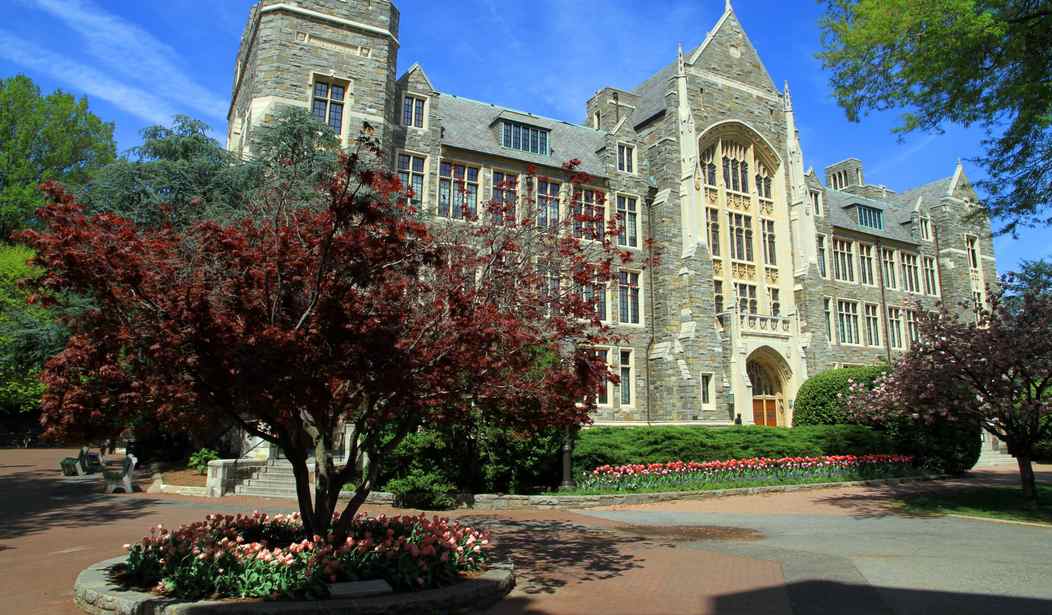Georgetown University undergraduate students voted to support a mandatory student fee for slavery reparations. Even supporters admitted that they do not know how the money will be used, and opponents warned that the mandatory fee would constitute a “slap in the face of liberty.”
Every student would have to pay a $27.20 fee each semester, creating a reparation fund to help the descendants of 272 slaves sold at an auction in 1838. The fund would support projects in impoverished communities where an estimated 4,000 descendants live.
Of the 3,845 students who voted, 2,541 students (66 percent) supported the mandatory fee, according to the Georgetown University Student Association Elections Committee. Voting took place online and ended at 11:59 p.m. Thursday, CBS News reported. Turnout was only 57.9 percent.
University administrator Todd Olson stopped short of announcing the fund’s inception, but he did say the non-binding student vote provided “valuable insight into student perspectives.”
“We all benefit from being on this campus, which exists today because of the 1838 sale. The fund is one way to repay the and people [sic] enslaved by the Jesuits forced to work for our future without compensation, many of whose families still feel the lasting effects of their ancestors’ enslavement,” the editorial board of the student newspaper The Georgetown Voice wrote in an op-ed supporting the proposal.
“This vote is an opportunity to show the university that the student body takes the issue of restorative justice seriously. We believe that the proposal, while imperfect, is a way to move past memorialization to concretely to address how our school’s past affects people in the present,” the editors added. They acknowledged still having “remaining questions about the fund and its controlling board—made up of five descendants and five students nominated by the [student body] president—which we would like to be fully answered by those who will see the referendum through.”
Two freshman students countered in an op-ed in The Hoya, Georgetown’s oldest student newspaper.
“In our tolerant and liberal society, we place great emphasis on the individual and her ability to make free choices,” Rizana Tatlock and Henry Dai wrote. “When the state or some other institution imposes one particular moral outlook or range of choices, it is frequently met with resistance. In contrast, the individual is expected to weigh her own circumstances and decide accordingly. This liberty promotes both a more just society and more individual happiness.”
Tatlock and Dai warned that the referendum involves “a mandatory fee which, by nature, represents a moral judgement on the responsibility of Georgetown students for the institution’s past. It contradicts that very value of liberty. Students would be compelled to act rather than having the choice to opt in. Regardless of your views on reparative justice, you should vote no on the GU272 referendum. Voting yes would support an unjust imposition of a moral judgement on the entire student body.”
“While some might argue that imposing collective action is just, true justice respects the autonomy of the individual. Adoption of this proposal, even by a large majority, would be a policy victory of brute force rather than one of measured persuasion,” the freshman students wrote. “Those who are not convinced by arguments for reparative justice will not be any more accepting after being dragged, kicking and screaming, into submission. In fact, such unjust treatment threatens to ingrain in them a deep sense of bitterness, sowing further division in our community.”
“No matter how strongly you feel obliged to donate to the descendants of the GU272, you should vote no to prevent an unjust imposition on your peers. Anything else would be a slap in the face of liberty,” Tatlock and Dai concluded.
Democrats running for president in 2020 have embraced slavery reparations, with Sen. Cory Booker (D-N.J.) sponsoring legislation on the issue. In addition to Booker, at least eight other 2020 Democrats have expressed support for the idea, including Senators Kamala Harris (D-Calif.), Bernie Sanders (I-Vt.), and Elizabeth Warren (D-Ma.).
While the idea of slavery reparations is attractive for social-justice minded Democrats, it is a fool’s errand. It is impossible to erase the injustice of the past, and taking money from some to give it to others will create a new injustice in the present. Fox News political analyst Gianno Caldwell, who is black, called reparations a “scam” and a “con job.” As the Georgetown students warned, such a policy would enforce a moral judgment on an unwilling populace.
Voluntary gifts and acts of charity, rather than reparations exacted by the long arm of the state, would better address wealth disparities.
Democrats often warn against “legislating morality” when it comes to an issue of life and death for the most vulnerable, like abortion, but reparations is far more a legislating of morality than protecting the unborn. It is not the job of the state to be the people’s moral compass, and it is not the job of the student government to dictate morality for its members.
Follow Tyler O’Neil, the author of this article, on Twitter at @Tyler2ONeil.









Join the conversation as a VIP Member